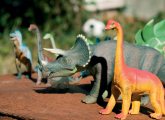Children’s author and illustrator Barroux tells TEY about the inspiration behind his latest book, I Love You, Blue...
How did you become a children’s book author and illustrator?
I’ve always loved drawing and I wanted to go to art school from a very early age. At that time however there were no special courses for illustrators, so I spent a year learning Visual Communication, then a year in Architecture.
I actually became an illustrator by sheer chance. One day I bumped into a girl I knew in the street, whom I hadn’t seen for a long time.
She was just coming out of the office of a publisher, who was going to publish one of her stories, and she asked me to if I could draw a few sketches to illustrate her story. The publisher liked them, and that’s how my first book happened. That meeting in the street changed my life.
Since then, I haven’t stopped. I quickly moved on to writing my own stories as well as doing the drawings, but I’m always very happy to illustrate stories by other writers.
What inspires your children’s stories?
The events of daily life are my inspiration. I read the newspapers every day; I listen to what people are saying, and I make lots of notes.
Not all my notes end up in a book. It’s important to first find the right way of approaching the story and presenting it to children. Think of it as lacing the poetry into the narrative.
All sorts of topics interest me. Ecology and the environment certainly play a big part in my books. But I’ve also done a book about a grandfather who suffered from Alzheimer’s disease.
Your stories carry powerful messages – how do you tell them in a way that resonates with young children?
I’ve always believed that children understand much more than adults think they do.
Children can have fears and concerns, and it’s possible that finding a book about some subject that bothers or worries them will help them in facing these things, or at least make it possible to talk about them. Nowadays there are books on all kinds of subjects.
I especially like those that have something positive to say to children. But to do that well needs great creativity and a poetic touch.
Can you tell us about the inspiration behind your new book, I Love You, Blue?
It all began in the café below my studio. I was down there reading a newspaper when I found a story about a dead whale washed up on a beach in Brittany.
That sort of thing had happened before but, in this case, scientists examined the whale’s body and found 16 kilos of plastic in its stomach. Mostly plastic bags, but also crisp packets, plastic tubes, wrappers and containers.
It was shocking, and I immediately started making sketches, jotting down words, looking for a story plan. A few days later it was all done, ready for publishing.
I thought the topic was a really important one, and that to make it into a story that would appeal to children might help towards saving the whales. It’s incredible to me that we can put people on the moon, yet it seems we can’t protect our whales, our bees, our birds…
How can early years providers use the book in their settings?
It can help children to start talking about the oceans, about plastic waste, and about how we can help to change things.
Storytelling supports children to understand the world around them, and can help us to introduce complex ideas about the environment and the important role we can play in looking after our planet and the animals in it.
Have a look around your setting with the children. How many things are made of plastic? Count them, and you may be surprised. Explore questions together – what might happen to plastic pens, bags and jars when we throw them away?
I’ve been in schools where they’ve organised competitions to collect and weigh plastic waste from their local area and compare their results with neighbouring schools.
It can also lead to discussions about the other creatures that live in the oceans, and how to protect them. Books can be a great starting point for a child to get interested in the subject and follow it up in their own way.
Children are tomorrow’s grown-ups. They are the ones who will make decisions and laws, and take action. We have to show them how our planet has been damaged, and that every little step towards improvement is vital.
More and more initiatives for positive change are appearing and, if we stick with it and everyone does their bit, things will change for the better. There is still hope.
Barroux is a renowned picture book illustrator and author. His latest book, I Love You, Blue is out now (published by Otter-Barry Books, £12.99).
Main image © Barroux 2022 from I Love You, Blue

Active learning in EYFS – How to encourage it
Editors picks
